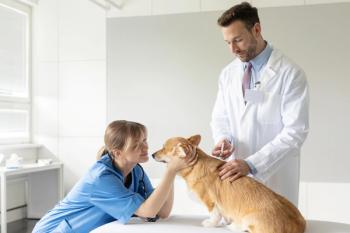
Face your fees head-on: Figure out what's changed, what hasn't, and what should (sponsored by Intervet/Schering-Plough Animal Health)
In this economic climate, there's pressure both to charge more and to charge less-and creative ways to hold the line.
When it comes to evaluating fees, these are times that try the souls of most equine practitioners. With the economy still showing only glimmers of recovery, you may be wondering if you should lower fees to keep clients, raise them to meet inflation, or stand pat.
There's no blanket answer, according to one veterinary financial expert. Numerous variables come into play, foremost of which are the geographic region in which you practice and how your bottom line is currently faring, says Dr. Karen E. Felsted, CPA, CVPM, chief executive officer of the National Commission on Veterinary Economic Issues (NCVEI) in Schaumburg, Ill.
Photo: Getty Images
Aside from those basic factors, Dr. Felsted offers some guidelines that can help you evaluate your fee structure—deciding what should change and what should not. "I'm not crazy about lowering fees because it appears that you're devaluing services," Dr. Felsted says. "Then how do you justify raising them again when times are good?"
However, Dr. Felsted says, lowering fees may be appropriate in some situations—for instance, if your clients have been hit hard by the recession and you're facing intense price competition from nearby practices. But if you're considering a decrease, be sure to perform a cost-benefit analysis of how it will help your business, then alert horse owners to the change. "It has to be an amount clients will notice, and you have to let them know you're doing it—otherwise what's the point?" Dr. Felsted says.
One practice that has done this is Rood & Riddle Equine Hospital in Lexington, Ky., which lowered fees by 3 percent to 4 percent and sent a letter to all of its clients announcing the change. Another option is to lower fees on competitive, routine care to keep clients coming in. "But even then you want to announce it," Dr. Felsted says. "Your letter could say something like, 'We know everyone is hard-hit with the recession and we want to do our part to make sure your horse still gets the care it needs.'"
On the flip side, rising production costs might cause some equine practices to consider raising fees. Is that a good idea? Not in every case. "There may be other things you can do, like cutting expenses and being more productive," Dr. Felsted says.
Holding the line
Three practitioners we talked to have done just that. Once they fully recognized the seriousness of the recession, all of them decided to hold the line on fees and instead try to add value that clients would perceive. "We've maintained our fees, but we try to be more accommodating to clients," says Dr. Steve Hicks, a solo practitioner and owner of Cedarcrest Farm & Equine Clinic in Palestine, Texas. "I give more of my time and give back to clients on some of the simple things."
Dr. Hicks's practice is mostly haul-in, and these days if he walks out to examine a horse and sees nothing seriously wrong, he might advise the client to wash the animal, take good care of it, and call him if necessary—and not charge for an office call. In the past he would have charged for this visit.
Dr. Ron Gaeta
Dr. Hicks, who's a past president of the Texas Thoroughbred Association, says he's well-positioned to ride out the recession without raising fees because of his solo status and the fact that his farm and most of his equipment are paid for. "My situation is different from many others'," he says. "I can't speak for those with two associates and some technicians on staff. Yes, our business has been down perhaps 25 percent, but I still see horses every day. Maintaining my fees seems to have been the right thing to do."
Adding value, being creative
Taking a simliar position is Dr. Ron Gaeta, who with two associates specializes in the care of sport and pleasure horses at Dunbarton Equine in Brookfield, Conn. "We didn't think it was prudent to cut any of our fees," Dr. Gaeta says. "Our costs haven't gone down; if anything, they've gone up. But so far we haven't raised fees either."
Like Dr. Hicks, Dr. Gaeta tries to add value to his services by spending more time with clients. For example, if a typical half-hour lameness exam runs to a full hour, he won't charge the higher fee. The practice is adding new services as well, such as an individualized nutrition analysis: First, a horse's body-condition score is determined based on weight, activity level, and food intake, then a computer program analyzes the composition of the horse's feed and makes a recommendation for improving nutrition. "We've saved our clients a lot of money—one client told us she saved more than $8,500 a year through better feeding that fights obesity," Dr. Gaeta says. "This service has helped generate extra income for the practice."
But that's not the only way Dr. Gaeta's practice has boosted revenue without raising fees. He's increased his emphasis on dental health and other wellness care as well. "If one of our technicians is on a nutrition call and sees something that requires a doctor's attention, the technician is on alert to direct the client to see us," he says. "We explain that, while they might spend $125 on that doctor visit, in the long run we've saved them money and they're happy. We're very proactive on wellness."
Dr. Gaeta says that when times are hard, people look for opportunities that provide a benefit but don't cost them money. He's capitalized on that tendency by hosting equine-health events to raise awareness of his practice. "We've always focused on client education, but now we've taken that a step further by putting on seminars, bringing in speakers to discuss topics like lameness or nutrition," he says. "These have been very well-received, and at these sessions we're able to pick up a lot of new e-mail addresses, which sometimes lead to new business."
And finally, Dunbarton Equine has transitioned most of its bookkeeping and office procedures to all-electronic mode, realizing substantial savings on paper supplies.
Seeing an increase ahead
Another practitioner who says his clinic left its fees unchanged is Dr. Damon O'Gan of Austin Equine Associates, a full-service equine veterinary hospital serving the Austin, Texas, area. He and two other doctors provide surgery, digital radiography, shockwave therapy, acupuncture, ambulatory services, and 24-hour emergency care. "We haven't lowered fees during the recession," Dr. O'Gan says. "Not one of our suppliers has decreased its prices to us. None of our leasing companies has lowered our monthly payments. Our employees have not offered to work for less, and we certainly don't wish to ask that of them."
What's more, Austin Equine Associates provides 100 percent employee health insurance, and premiums have risen substantially. "We simply cannot afford to decrease prices," Dr. O'Gan says. "That said, we haven't increased prices in the past year, but we are about to, as our suppliers have increased their prices."
Overproduction problem
Financial pressure from rising costs is particularly strong in the equine industry, say veterinarians and horse breeders. "Production costs have been at their highest levels in history in this business," says Geoffrey Russell, thoroughbred sales director for Keeneland Thoroughbred Racing and Sales in Lexington, Ky.
Dr. Felsted says the recession has impacted the equine industry as a whole more than the companion animal veterinary market. "There really are two issues here," she says, "the impact of the recession itself and the impact of trends that were already brewing pre-recession and that the recession exacerbated."
One of these pre-recession trends with big financial consequences has been the overbreeding of horses, particularly in the thoroughbred industry. As evidence, the September yearling sale at Keeneland ended with the biggest declines in recent history. Gross receipts were down 41.5 percent, the average sale was down 33.2 percent, and the median sale was down 40.5 percent.
Officials there attribute the declines to a market correction resulting from overproduction, record production costs, and the overall effects of the worldwide recession. "I don't think anyone was surprised that we were down," said Russell, "but I don't think anyone thought it would be this much. But then no one could have imagined that we were going to have an international financial calamity."
Raise fees with caution
For practices that feel a fee increase is necessary because of the cost squeeze, Dr. Felsted offers this advice: "I wouldn't launch into a big fee increase anytime soon. People's mindset is still tentative. You may feel that you have to raise fees 3 percent to cover inflation, but above that I'd be careful."
She says the NCVEI conducted a survey in August asking veterinarians whether they raised fees in 2009 or planned to in the near future. Of the 233 respondents, just over half said they already had or would increase fees 1 percent to 4 percent, while 23.6 percent had or would raise fees 5 percent to 8 percent. Just over 19 percent did not increase fees and don't plan to soon, while just under 1 percent lowered their fees. "I was surprised at the number raising fees beyond 3 percent," Dr. Felsted says. "But that just reflects the fact that some areas of the country have weathered the recession better, and so did some individual practices."
James M. Lewis is a writer for Advanstar Communications.
Newsletter
From exam room tips to practice management insights, get trusted veterinary news delivered straight to your inbox—subscribe to dvm360.






